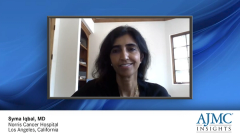
New Gastroesophageal Treatment Therapies Impacting Patient Quality of Life
James Cleary, MD, PhD, and Laura Bobolts, PharmD, BCOP, highlight new GI and esophageal cancer therapies and their positive impacts on their patient population.
Episodes in this series

Laura Bobolts, PharmD, BCOP: We’re always hopeful when new oncology drugs get approved and when we have new categories of therapies available for our patients with cancer. We hope that they can impact the patient’s quality of life, especially when we’re treating patients in the palliative, intense setting, when we know we can’t cure their disease and we need to put quality of life at the focus of everything we do for them.
But one of the biggest challenges is that, at times, we may have to assume that a therapy can improve quality of life. Our clinical trials are rightfully powered for end points such as overall survival or progression-free survival, but I’ve seen trials not put quality of life even as a secondary end point. Then you’re scratching your head, especially if it’s only a progression-free survival improvement, or pembrolizumab plus trastuzumab and chemotherapy in HER2 [human epidermal growth factor receptor 2]–positive gastric cancer. In that scenario, based on the KEYNOTE-811 clinical trial, the FDA approval was an accelerated approval based on an objective response rate only, which is shrinking of the tumor.
In those scenarios of surrogate end points, meaning objective response rate and progression-free survival, you hope that you can improve the patient’s quality of life and that those are meaningful end points. But if you don’t have quality of life evaluated in the clinical trial, you might not know. This is also an unmet need, that we need more clinical trials to evaluate quality of life. Even if a therapy improves overall survival, it might not improve quality of life. That’s a challenge because you’d hope it would.
For example, CheckMate 648 looked at nivolumab plus chemotherapy or nivolumab plus ipilimumab in patients with advanced metastatic esophageal squamous cell carcinoma. I applaud them for evaluating health-related quality of life in that trial. But at ASCO GI [American Society of Clinical Oncology Gastrointestinal Cancers Symposium] 2022, it was presented that there’s a trend toward better health-related quality of life with nivolumab-based therapy vs chemotherapy alone. But that trend wasn’t statistically significant. That makes me scratch my head because I want to see the quality of life improved in our patients with cancer. But from a payer’s perspective, if a therapy has survival benefits, that’s the gold standard that I’m looking for. We need more health-related quality-of-life studies with these therapies.
James M. Cleary, MD, PhD: Immunotherapies have been a great benefit to our patients. They’re more effective. That’s the bottom line. But it can have great gains in terms of quality of life, especially in patients who are really sensitive to PD-1–directed therapy. They aren’t as frequent as we’d like, and they’re on the rare side, but occasionally you’ll see patients who have great responses. After 6 to 12 months of therapy, you realize you don’t really need the chemotherapy anymore, so you stop the chemotherapy and you give them only PD-1–directed monotherapy. They continue responding and then eventually–after 2 years or so–you wonder whether you even need to treat them with PD-1–directed monotherapy because their immune system is so active. By getting immunotherapy into our algorithms, patients live longer. Some patients have long-term responses, and sometimes you don’t need to keep therapy going. It’s rare, but it happens. For those patients, it’s wonderful.
Transcript edited for clarity.
Newsletter
Stay ahead of policy, cost, and value—subscribe to AJMC for expert insights at the intersection of clinical care and health economics.











